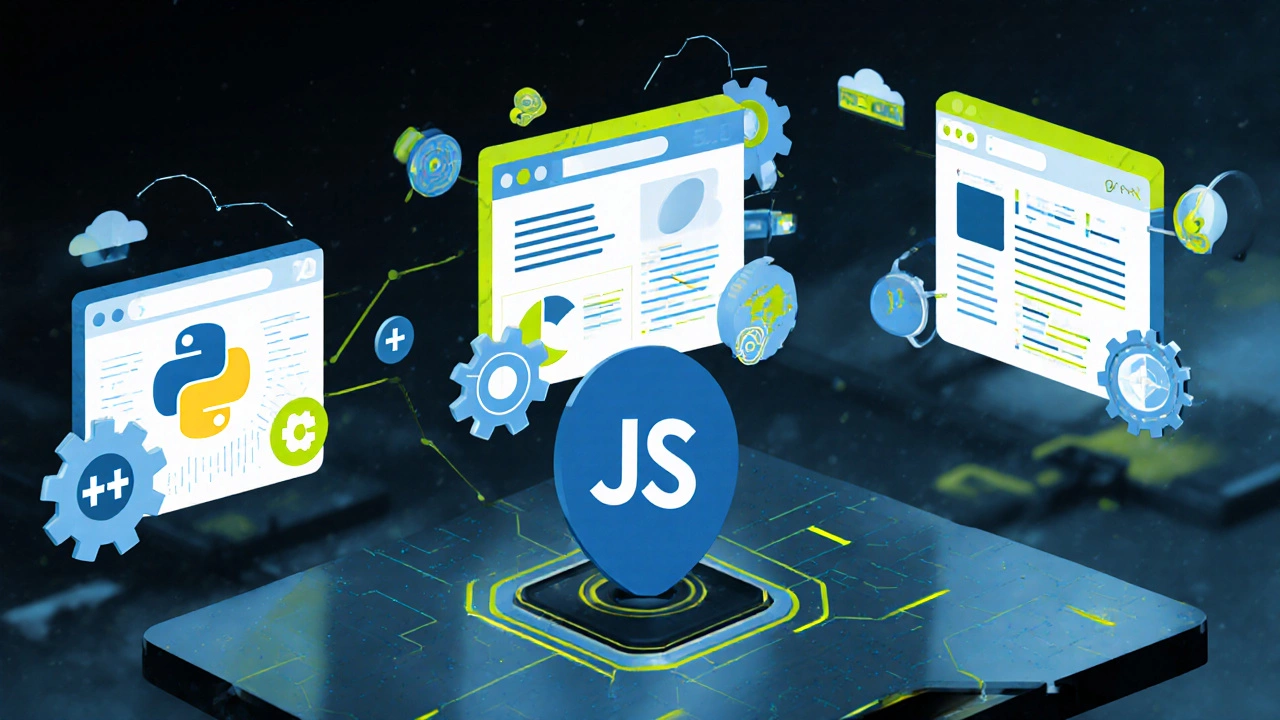Python vs C++ Performance Calculator
Compare Performance Metrics
Select a task to see the performance difference between Python and C++
Python and C++ are both powerful languages, but they don’t compete in the same space-especially when it comes to front-end development. If you’ve heard someone say Python will replace C++, they’re mixing up the battlefield. C++ isn’t running in your browser. Python isn’t building high-speed game engines or real-time trading systems. They serve different masters.
What’s Actually Happening in Front-End Development?
Front-end development runs on JavaScript, HTML, and CSS. That’s it. No matter how popular Python gets, it doesn’t run natively in browsers. You can’t drop a Python script into a webpage and expect it to work. Tools like Pyodide let you run Python in the browser by compiling it to WebAssembly, but that’s a workaround-not a replacement. It’s slower, heavier, and used mostly for niche cases like data visualization in educational apps or scientific dashboards.
C++? It’s nowhere near the front end. You won’t find C++ in a React component or a Vue template. C++ is used where speed and direct hardware control matter: game engines (Unreal Engine), operating systems, embedded systems, and high-frequency trading platforms. Even in web-related work, C++ shows up behind the scenes-like in Chrome’s V8 engine, which powers JavaScript execution. But you don’t write C++ to make a button animate or a form validate.
Why People Think Python Might Replace C++
The confusion comes from Python’s rise in back-end and data-heavy roles. Python powers Instagram’s servers, handles AI models on AWS, and automates DevOps pipelines. It’s simple to learn, has clean syntax, and a massive library ecosystem. Meanwhile, C++ feels old-school: manual memory management, complex syntax, long compile times. To someone new, C++ looks like a relic.
But here’s the truth: Python’s popularity doesn’t mean it’s eating C++. It’s expanding into new areas where performance isn’t the top priority. C++ is holding its ground where performance is non-negotiable. You don’t swap a Formula 1 engine for a hybrid car just because the hybrid is easier to drive.
Performance: The Real Divide
Let’s talk numbers. In a 2024 benchmark test by the Computer Language Benchmarks Game, C++ handled a Fibonacci calculation 27 times faster than Python. In real-time graphics rendering, C++ runs at 120+ FPS on low-end hardware. Python? Even with optimizations, it struggles to hit 30 FPS without heavy caching or external libraries.
Front-end apps need to respond instantly. A laggy button click ruins user experience. That’s why browsers stick with JavaScript-compiled to machine code via JIT engines-and why companies like Google and Mozilla invest billions in optimizing those engines. Python doesn’t have that kind of infrastructure in browsers. It can’t compete on speed, and that’s not changing.

Where Python and C++ Actually Coexist
There are places where both languages play roles-but not as rivals. Think of a video editing app built with C++ for performance, then wrapped in a Python-based plugin system. Or a machine learning model trained in Python, then exported as a lightweight C++ library to run on a mobile device. That’s collaboration, not replacement.
In web development, you might use Python (Django or FastAPI) for the back end, while the front end runs on React or Svelte. C++ might be used in a browser extension that needs to process large files locally, or in a WebAssembly module that handles image compression. But again, that’s not Python replacing C++. It’s each tool doing what it’s best at.
What Front-End Developers Should Actually Learn
If you’re a front-end developer wondering whether to switch from JavaScript to Python, stop. Learn JavaScript deeply. Master React, TypeScript, Web Components, and performance optimization. Understand how the browser’s rendering pipeline works. Learn how to reduce bundle sizes and improve LCP and FID scores. Those skills move the needle.
Python might help you automate testing, generate static sites with Pelican, or build a CLI tool to manage your assets-but it won’t help you make a smoother scrolling animation or fix a layout bug on iOS Safari. Those problems need JavaScript, not Python.
And if you’re curious about C++? Great. Learn it if you want to work on game development, VR, or performance-critical systems. But don’t expect to use it in your next website. The tools don’t match.

The Future Isn’t One Language Winning
The idea that one language will “take over” another is outdated. Modern development is about mixing tools. Rust is gaining ground for safe systems programming. WebAssembly lets you run C++, Rust, and even Go in the browser. Python is growing in AI and automation. JavaScript keeps evolving with new APIs and frameworks.
No one is betting on Python to replace C++. The real question is: how do you use both effectively? If you’re building a web app with real-time 3D visuals, you might use C++ via WebAssembly for the rendering engine and Python on the server to train the AI that controls the visuals. That’s not competition. That’s synergy.
Bottom Line: They’re Not Rivals
Python won’t take over C++. C++ won’t take over Python. They’re not even in the same league when it comes to front-end development. C++ is for systems, performance, and control. Python is for speed of development, data, and automation. Front-end development? That’s JavaScript’s domain-and it’s not going anywhere.
If you’re trying to decide what to learn next, don’t ask which language will win. Ask: what problem are you trying to solve? Then pick the right tool. Not the trendiest one. Not the one everyone’s talking about. The one that actually fits.
Can Python be used for front-end development?
Python can be used in front-end development only through workarounds like Pyodide or WebAssembly, which compile Python to run in browsers. These are niche solutions used for data-heavy visualizations or educational tools, not for building standard web apps. JavaScript remains the only language natively supported by all browsers for front-end tasks.
Is C++ used in web browsers?
C++ isn’t used to write web pages, but it’s the backbone of browsers themselves. Chrome’s V8 engine, Firefox’s SpiderMonkey, and Safari’s JavaScriptCore are all written in C++. These engines execute JavaScript code at high speed. So while you don’t write C++ for your website, your website relies on C++ to run.
Should I learn Python or C++ as a front-end developer?
Learn JavaScript first-then TypeScript. These are the only languages you need for front-end development. Python is useful for back-end scripting, automation, or data tools, but it won’t help you build responsive UIs. C++ is irrelevant for front-end work unless you’re building browser extensions or WebAssembly modules for performance-critical tasks-something very few front-end devs need to do.
Does WebAssembly make C++ a front-end language?
WebAssembly lets you run C++ code in browsers, but it doesn’t make C++ a front-end language. It’s a compilation target, like how you might compile Python to WebAssembly. Most front-end developers still write UI code in JavaScript or TypeScript. C++ in WebAssembly is used for heavy lifting-like image processing or physics engines-not for buttons, forms, or layouts.
Will Python replace C++ in any part of web development?
No. Python is replacing C++ in areas like scripting, automation, and data science-not in performance-critical systems. In web development, Python is strong on the server side (Django, Flask), while C++ remains dominant in browser engines, game engines, and embedded systems. They solve different problems and will continue to coexist.
